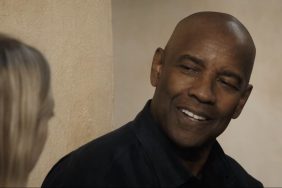TIFF Day 3 was our busiest in terms of getting in movies and most of them seemed to be genre-related, either horror or fantasy, although generally different takes on them. To be perfectly honest, that one day took so much out of us that it took longer than usual to write up all the movies we saw. (You can read our earlier reviews here and see short takes on the other movies we’ve seen on our Twitter feed.)
On the surface, the film revolves around the traveling circus of the film’s title, but it’s really a film about no less than a bet between God and the Devil. The former is represented by Christopher Plummer’s Dr. Parnassus, a drunken sage who grants people their inner-most desires via a mysterious mirror that transports them into his “Imaginarium”–assisted on the makeshift stage by his lifelong right hand man Percy (Vern Troyer), his teen daughter Valentina and his young liege Anton (Andrew Garfield). Parnassus isn’t just the drunken old man he seems to be, but an immortal who has been in competition with the Devil for centuries, having made a deal to gain that immortality and been on the road trying to find disciples in order to win their wager. As Valentina reaches her 16th birthday, the Devil, ably played by Tom Waits, has come to collect her as his winning. Before he can do so, the group meets a mysterious man in white hanging from a rope under a bridge. The nameless man, played by the late Heath Ledger, is a charming smooth talker who immediately helps increase the troupe’s business by convincing women to pass through the mirror, though his acceptance into Parnassus’ inner circle causes tension with Anton who has had a crush on Valentina but never acted on it. He immediately sees the nameless stranger as a threat, especially when he learns that he is in fact a philanthropist named Tony who disappeared after a scandal involving money meant for children. Tony brings a new interest in the Devil to extend his wager with Parnassus to a contest for whomever can win over five souls.
What makes the film immediately appealing is that many of the themes hark back to ones explored by Gilliam’s earlier films. Those who’ve followed the filmmaker’s career since his days as animator on Monty Python will be well aware of his imaginative visual sense of humor and with Parnassus, he’s able to realize that imagination using live action via a combination of absolutely spectacular sets and a creative use of CG. The excursions into the Imaginarium are the film’s high points because they’re amazing to behold, and the flashbacks to Parnassus’ past also allow Gilliam to flex his visual muscles along with his marvelous DP Nicola Pecorini, who is more than capable of capturing that vision on film.
The film isn’t perfect though, and the sticking point for many will probably be the erratic performances that are sometimes so heightened and exaggerated that it makes the interaction between the characters difficult to put up with for very long, especially pertaining to the love triangle between Valentina, Anton and Tom. Because of this, one never fully connects with any of the characters except for Parnassus himself, but that’s because however you slice it, this film really belongs to Christopher Plummer, as he gives the performance of his career as the aging immortal. Tom Waits and Vern Troyer also offer some of the film’s funniest moments as they interact with Plummer.
So much of the focus on the movie has been put on the fact it features Heath Ledger’s final performance and Gilliam even gives him top billing in the end credits, dubbing it “A Film by Heath Ledger and Friends.” Even so, it’s not Ledger’s best performance by a long shot. In fact, Jude Law and Colin Farrell who play Tony in his second two journeys through the mirror tend to get far better dramatic scenes than Ledger has in the real world. The fact that he looks different even becomes a gag as he’s chased into the Imaginarium by various shady individuals.
Even so, there’s little question that “Imaginarium” is a step back in the right direction for Gilliam, since he’s once again allowing his own imagination to run free unhindered. “Parnassus” fits perfectly next to Gilliam’s earlier films, and more often than not, his distinctive humor and the visuals help the movie overcome any of the weaker moments.

“Chronicles of Narnia” star Ben Barnes takes on the title role who we meet as he’s arriving in London, fresh-faced off the train, completely unaware of what’s in store for him once he falls in with a rich philanthropist named Lord Henry, played by Colin Firth, who hopes to bring Dorian into his world of excess. A local painter named Basil (Ben Chaplin) has become smitten with the young man’s looks and hopes to capture them on canvas, the portrait leading to Dorian making an off-hand comment about making a deal with the devil to look like that forever. In the meantime, Dorian has fallen in love with an actress named Sybil but as Henry corrupts the young man, he becomes further entrenched in a world full of sex, drugs and general debauchery–at one point deflowering a debutante almost on a dare. He pushes Sybil away, and she kills herself, throwing him into further despair. The effects of Dorian’s behavior has begun to show up on the painting, starting with circles under the eyes, but soon, there are pus-filled blisters and boils with maggots living inside turning the painting into an abomination. The suspicious painter wonders why Dorian has locked the painting in the attic and is brutally killed for his curiosity and Dorian flees the country. He returns to England twenty years later looking exactly the same, but by now, Henry has had a child and she’s grown into a young woman played by Rebecca Hall, who becomes involved with Dorian, completely oblivious to his dark side.
Director Oliver Parker has created an impressive character piece that explores important themes about the price one pays for doing or being bad, as well as embellishing aspects of the original story that have never been fleshed out so elaborately, such as the relationship between painter and subject. It’s not a perfect film by any means, but it’s a fine rendering of Wilde’s story which focuses a lot more on the interaction between the characters than a Hollywood version of the movie might ever have done. Some of the CG in the latter part of the film might not be up to the standards of modern audiences, but strong well-rounded performances by Barnes and Firth more than make up for it. The results are an intense thriller that keeps you captivated with good old fashioned storytelling, so older audiences will probably appreciate more than younger ones.

This is a world of fire and smoke and ash where nothing has been left alive and the few surviving humans are starving and mostly looking for a way out. Some have banded together to form cannibalistic gangs who prey on the weak, backwoods militiamen doing what they have to do to survive, traveling in big groups bearing clubs and knives. Into this world has ventured a nameless hero, played by Viggo Mortensen, his main role being the overprotective father to his son. The image of the two of them walking with a cart full of their collected junk makes it hard not to be reminded of the “Lone Wolf and Cub” movies, and this world is no less menacing for the lack of CG beasties ala “I Am Legend,” because just finding food can be difficult.
The film is essentially a two-hander and it’s clear that one hand is much stronger than the other, because Mortensen is forced to carry the film for young Kodi Smit-McPhee, who plays his son, because like most movies featuring young kids, the latter can get annoying at times with his constant cries of “Papa!” Viggo’s sullen performance is perfect for a man who has given up hope but must endure for his boy, and you can feel for him every step of the way. Like “Dorian Gray,” the film plays with the ideas of good people doing bad things, as the man is always telling his son that they are “the good guys,” then doing things that makes the boy question that claim.
Over the course of their journey, they have a number of brief encounters, mostly with bad people who want to kill and eat them, but also with a few similar survivors, including an entirely unrecognizable Robert Duvall as a blind old man they choose to help. Every once in a while, the film flashes back to time the man had with his wife after the event that changed the world and before she gave up hope herself and walked off into the snow never to be seen again. For such a small role, Charlize Theron really gives it as much as she has any of her leading roles.
The film looks absolutely stunning due to the amazing landscapes Hillcoat either captures or creates with his talented DP and set designers. In some ways, Hillcoat is taking a similar approach in terms of tone and style as Andrew Dominik did with The Assassination of Jesse James…, that tone helped greatly by the ambient score by Nick Cave and Warren Ellis, the composers both movies have in common.
Even if you have problems with the deliberately languid pacing that carries through for two hours, “The Road” really pulls you in and sticks with you because you’ll be left wondering if you could survive in this world and what you might have to do in the name of that survival. In that sense, Hillcoat’s film is an immense success, and an incredibly strong piece of dramatic storytelling.

Byrne’s film has potential at being the type of ode to troubled and disaffected Australian youth that could have filled a necessary niche, but instead, it turns into another derivative gore-filled shocker that goes for laughs by paying homage to the outlandish low-budget video nasties of the ’70s and ’80s. Making such homages is no longer original–or entertaining for that matter–not when the movie lacks the storytelling and filmmaking skills required to pull it off.
We meet Brent (Xavier Samuel) as he’s driving through the countryside with his father as a passenger, a freak accident killing the latter. Six months later, Brent is getting his life back together and ready to go to prom with girlfriend Holly when he falls foul of Robin McLeavy’s Lola, a classmate who feels dejected when he turns her down for the prom. While spending some alone time, he’s kidnapped and when he wakes up, he finds himself sitting at a creepy family gathering ala “Texas Chainsaw Massacre,” before Lola proceeds to carve Brent up and drill a hole in his head with plans to add him to her collection of brain-dead love interests. You see, Lola collects the boys she has crushes on, turning them into inhuman carnivorous creatures she locks in the basement, not too unlike the ones found in The Road. Frankly, if you’ve seen Misery than you’ve already seen a far better version of this type of movie.
The biggest problem is that we’ve barely met Brent before he’s captured and we’re not given nearly enough time or reason to care what happens either way. In fact, it’s hard to feel much of anything except disgust when Lola and her father start to go to work on him, and the drastic transition in his personality from sullen, almost suicidal to his angry violence as he tries to escape just never rings true.
The film cuts back and forth between Brent’s predicament and his best friend Jamie (Richard Wilson), as he goes on his own awkward prom date with his dream girl, a hot Goth chick, played by Jessica McNamee. These scenes are entertaining enough, even if they don’t seem to have any particular purpose and the connection to the main story is very thin, almost negligible. Either way, Wilson makes the protagonist’s best friend more interesting than the main character, which is never a good way to go.
The entire film is ridiculously sensationalistic and over-the-top, particularly the performance by Robin McLeavy as Lola, and the cringe-worthy incestuous relationship between her and her father just makes it hard to stomach. It’s easy to see there is potential in Byrne’s debut but most of it is squandered in a desire to win the audience over by grossing them out with blood, gore and cheap laughs.

What none of them realize is that there’s more to the relationships between these three people than we first might assume and as those truths come out, it takes this from being a straightforward thriller to something far more intriguing as the duo’s well-devised plan starts to unravel, and alliances and mindgames between the three players start to unravel.
Sporting a full beard, Vic is Eddie Marsan displaying his angrier and rougher side, although there’s a surprisingly sensitive side to Vic that is allowed free once in a while. Danny is the far more subservient and uncertain of the men, essentially going along with Vic’s plan but constantly having second thoughts, putting him in the middle of a power struggle between two very strong individuals. The title role is an extremely daring one for Gemma Arterton–currently known for her brief appearance as Agent Strawberry Fields in Quantum of Solace–not only due to the amount of nudity and the humiliations she’s forced to endure during her capture, but also the amount of emotional range the role requires her to portray. It will be interesting to see how much of this she carries to her two high-profile blockbusters she’s starring in next year.
Blakeson is a filmmaker to watch due to the masterful way he’s created such a riveting twist-filled film out of such a simple premise, finding a way to stage the performances by these three incredible actors in a set that essentially consists of three rooms in an apartment. Eventually, it does go outside as it builds to its climax, and that ending does feel like it goes on a little too long, even if it does lead to an unexpected payoff when the title finally comes on screen.
Either way, Disappearance is a film like Shallow Grave or Following, the quality of debut that can kick off a healthy career as a filmmaker ala Danny Boyle or Christopher Nolan, especially if Blakeson can follow through with an even stronger sophomore effort.
(We also tried to catch George Romero’s Survival of the Dead but by the time it started at 12:30 AM, we were falling asleep.)
That’s it for our longest and most intensive day, and next up, we’ll have our coverage of Days 4 through 6 at TIFF, which were generally lighter in terms of movies, but we did see a couple of fantastic films, as well as a couple general disappointments.









